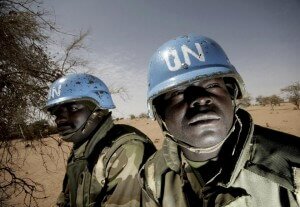 Every nation is responsible for protecting its own citizens from mass atrocities.
Every nation is responsible for protecting its own citizens from mass atrocities.
Should a nation fail to protect its citizens from mass killings, either intentionally or through inability to act, it is the internationally community’s responsibility to protect the citizens being affected.
These principles, which were agreed upon by the United States and other nations and ratified by the United Nations, are known as the Responsibility to Protect (or R2P) Doctrine.
What is R2P?
R2P, or the Responsibility to Protect doctrine, is a concept of state and international responsibility to citizens, which was adopted by the 60th Anniversary United Nations Summit. The doctrine states:
Each individual State has the responsibility to protect its populations from genocide, war crimes, ethnic cleansing and crimes against humanity… We accept that responsibility and will act in accordance with it…
The international community, through the United Nations, also has the responsibility to help to protect populations from genocide, war crimes, ethnic cleansing and crimes against humanity. In this context, we are prepared to take collective action, in a timely and decisive manner, through the Security Council, in accordance with the Charter, including Chapter VII…, should peaceful means be inadequate and national authorities are manifestly failing to protect their populations from genocide, war crimes, ethnic cleansing and crimes against humanity.
Essentially, R2P recognizes that, while sovereign states are independently in charge of their own citizens, should they fail to protect their citizens from mass killings, either intentionally or through their inability to act, it is the internationally community’s responsibility to protect the citizens being affected.
What are the Responsibilities of the International Community under R2P?
Under R2P, the international community has three main responsibilities: the responsibility to prevent, the responsibility to react, and the responsibility to rebuild.
According to R2P doctrine, the number one priority and responsibility of the international community is prevention. The international community is obligated to spend the most time and resources on ensuring that conflicts and crises are prevented or halted before genocide or mass atrocities occur. Should the conflict escalate, the international community has a responsibility to react.
When reacting to a mass atrocity, the community is always to start out with the least intrusive and coercive measures possible. Military intervention should not be used unless absolutely necessary.
R2P does recognize that sometimes military intervention is necessary, but asserts that military intervention should only be used if there is just cause and all precautionary principles are observed. Should military intervention occur, the global community has a responsibility to rebuild after the intervention has occurred and aid in recovery and reconciliation, as well as directly address the cause and necessity for military intervention in the first place.
What Constitutes as Just Cause for Military Intervention? What are the Precautionary Principles?
The International Crisis Group summarizes just cause for intervention as large scale loss of life which is the product either of deliberate state action, or state neglect or inability to act, or a failed state situation OR large scale “ethnic cleansing,” actual or apprehended, whether carried out by killing, forced expulsion, acts of terror or rape.
Again, military intervention should only be used as a last resort, so not only must these conditions exist, but all other options must be exhausted.
When considering military intervention, there are precautionary principles that need to be examined. Much like the rules of war, before deciding to intervene the international community must be sure that they have the right intentions in mind, that there are no other options left, that the means of intervention are proportionate to the crimes being committed, and that there is a reasonable chance of success.
It is also important to recognize that authority to intervene should, in most cases, come from the UN Security Council.
Common Misconceptions
Isn’t R2P Just an Excuse or Right to Military Intervention in Other Countries?
No. As previously stated, R2P strongly discourages military intervention unless absolutely necessary. Instead emphasis should be put on prevention, helping others prevent atrocities, and responding in the least intrusive and coercive manner possible. Furthermore, the R2P does not advocate for coercive military intervention in every case where there is large scale loss of life – only those cases which a) exhibit just cause and b) meet the precautionary principles.
Does Abiding by the R2P Doctrine Mean We Have a Responsibility to Protect Everyone from Everything?
No. Again, R2P only comes into play when dealing with, as Gareth Evans of the International Crisis Group puts it, matters of “conscience shocking killing,” ethnic cleansing, etc. While other issues of citizen rights and safety are important, R2P only applies to horrific, large scale killing.
Why Should We Care?
Because now more than ever, every country is connected to and dependent upon one another. The success or failure of one country is ultimately connected to the success or failure of the entire internationally community. Our own success and security depends on security in every country. It is our duty to protect all of humanity and to ensure security for all.
For more information visit the International Coalition for the Responsibility to Protect.




